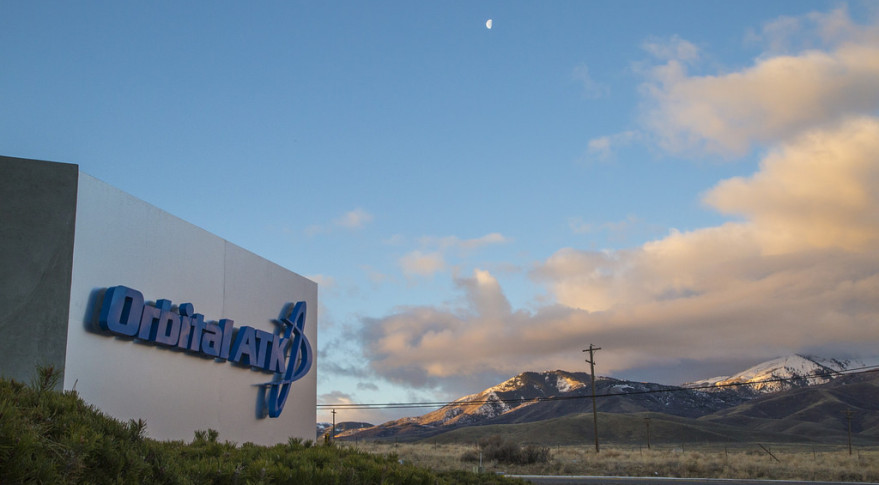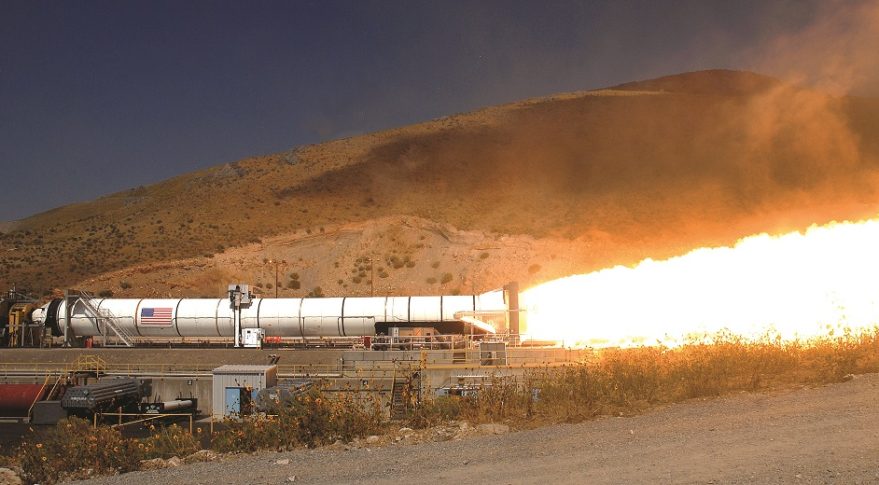Orbital Developing Rocket To Compete With SpaceX, ULA
Orbital ATK is developing a new intermediate to heavy-class rocket that could eventually compete with SpaceX and United Launch Alliance to launch national security satellites.
The recently merged rocketmaker, based out of Dulles, Virginia, won a $46 million U.S. Air Force contract as part of the service’s efforts to help wean itself from the Russian rocket engine used in launching most military satellites. Some of Orbital ATK’s new work will be used in ULA’s next-generation Vulcan rocket. But the Air Force said in a Jan. 13 announcement that the technologies, including a Common Booster Segment solid rocket motor, “are intended for use on an Orbital ATK next generation launch vehicle.”
Orbital ATK officials confirmed Jan. 14 that the company was studying a medium- to heavy-class rocket that would compete in the Air Force’s Evolved Expendable Launch Vehicle program. The new rocket, which does not have a name, would primarily be powered by solid motors, said Mark Pieczynski, vice president of business development for Orbital ATK’s flight systems group.
A first flight could come as soon as 2019, he said.
“Orbital ATK is evaluating concepts that utilize solid propulsion elements as the basis of an American-built, intermediate to heavy class family of EELVs capable of launching Air Force and other payloads,” Pieczynski said in an email. “The solid propulsion and propulsion elements we are developing under this agreement will help achieve low-cost assured access for current and future National Security Space launch requirements.”
Blue Origin’s BE-3 engine is the leading candidate to become the rocket’s upper stage engine, although Orbital ATK is studying other options as well, Pieczynski said. The BE-3 also is one of three upper-stage engines ULA is considering for Vulcan.
Congress has directed the Defense Department to develop domestic propulsion systems that would enable the Air Force by 2019 to end its reliance on the Russian RD-180 rocket engine, used to power ULA’s Atlas 5 rocket.

Before Orbital Sciences and ATK merged in February 2015, the two companies had considered independent and joint responses to the Air Force’s request for propulsion solutions. Both were long thought to have an interest in the national security market by industry and government officials. In 2014, ATK executives argued solid-rocket motors are a relatively near-term replacement and less expensive option than liquid fueled engines, despite a preference from lawmakers for a plug-and-play option to replace the RD-180.
With the Jan. 13 award, Pieczynski said Orbital ATK would spend much of its time in the next few months determining the optimum size of the solid rocket motors.
The base Air Force contract would cover qualification testing, structural testing and a critical design review in the first half of 2017. If the Air Force exercises all options, the contract could include a static fire test in 2018 and a test flight in 2019.
Orbital ATK submitted a letter of intent to the Air Force last year to start the certification process that would allow the rocket to launch national security payloads.
Pieczynski said the development of a certification plan, which includes how many successful launches the rocket would need before flying Defense Department payloads, would begin in the first half of this year.
If certified, the new rocket would compete with SpaceX’s Falcon 9 and Falcon Heavy rockets and ULA’s Delta 4 Heavy and Vulcan rockets. The Air Force and U.S. lawmakers have put a premium on having what they call “assured access to space.” By policy that would mean the Defense Department would have at least two providers to launch military and spy satellites.
The emphasis on assured access comes because Air Force leaders are concerned about a potential gap in future years. ULA has said it is retiring its Delta 4 rocket around 2018, leaving the company’s Atlas 5 rocket for medium-class missions to compete with SpaceX’s Falcon 9 rocket. However, the future of the Atlas 5 has been clouded by questions about the availability of the Russian engine that powers the rocket.
In addition, SpaceX’s Falcon Heavy rocket has yet to make its first flight, leaving ULA’s Delta 4 Heavy as the only heavy-class rocket available to the Defense Department.
-
Latest
 In the wake of Northrop-Orbital merger, Aerojet’s solid rocket engine business teetering on the brink
In the wake of Northrop-Orbital merger, Aerojet’s solid rocket engine business teetering on the brinkDuring the Cold War, the Pentagon bought enough solid rocket motors for intercontinental ballistic missiles to support seven suppliers. The demand for solid motors collapsed in the 1990s and dropped e...
-
Next
 "Loki" makes the next stage of MCU the focus
"Loki" makes the next stage of MCU the focusThe following contains vague spoilers for the first episode of Loki. Somewhere in the multiverse is a reality where the world was not put on hold by COVID, and all the hotly anticipated film releases...
Popular Articles
- Rocket Power (TV Series 1999–2004) - Rocket Power (TV Series ...
- technique - What is the definition of 'playing in the pocket ...
- "Pocket rockets," in poker Crossword Clue Answers, Crossword ...
- 5 Sex Toys Every Man Should Own, Use & Use Again - LA Weekly
- Pocket Holsters: 11 Options For Easy Everyday Carry (2021 ...
- What is Elton John's most successful song? (Celebrity Exclusive)
